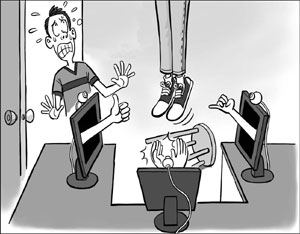Need to cast a critical eye on cyburbia
By James Harkin (China Daily)Updated: 2007-04-18 06:47
LONDON: A hundred visitors to an Internet chatroom last month witnessed an English father of two hang himself in front of his webcam.
Some of Kevin Whitrick's fellow chatters must have imagined he was play-acting, but others were happy to goad him into killing himself. As Whitrick's face turned purple and he began to die, one chatter punctured the heady atmosphere by wondering: "Is this real?"
Whitrick's final moments tell us something important about what the Internet has become. In this brave new world of the web, even suicide can be an interactive performance egged on by a crowd of eager spectators.
In the course of the last decade, many of us have quit watching the box in the corner of the room and turned to fiddling around with gadgets through which we can watch each other instead. The web has morphed into a vast virtual suburbia to which many of us have retired to stare idly at each other's lives.
To Internet geeks this is known as "peer-to-peer" communication or "Web 2.0"; the rest of us could just as easily call it cyburbia. For millions, this online culture is the only culture that matters. Websites such as YouTube and MySpace have become pleasure parks through which almost every kind of human experience can be funneled.
We have heard a great deal about this exciting explosion of creativity. Small wonder, then, that the marketers, venture capitalists and media behemoths are piling into cyberspace to exploit this orgy of self-expression.
Thus far, however, the sociologists and social critics
have been notable only for their absence. What about the psychological effects
of constant watching and being watched? 
From the people who Google themselves and lovers obsessively, to those who stare at strangers on a webcam, there is good evidence that our time spent in cyburbia is less about social networking than about an obsessive desire to see and be seen.
Where once we all wanted to see and be professional actors, sites like YouTube feed a newer fetish for amateurism an anguished cry for authenticity in an apparently superficial world.
Then there is the kind of rhetorical activism on blogs and chatrooms where everyone has to have their say while no one really listens. When we stare out the window onto cyburbia, what we see is a place that thrives on feverish rumor and illicit sexual liaisons, populated by voyeurs, exhibitionists, amateur enthusiasts and even trainee terrorists.
Our celebration of life in cyburbia needs to be balanced with serious social investigation of what happens to people who spend so much time there, and what it says about our society that they should want to.
Why has there not been any studies? The reason is that many of us have so much invested in Web 2.0 that we have hurled our critical faculties out the window.
Partly to blame are the middle-aged men who run the media and business worlds, whose biggest fear is that technology might leave them and their careers behind.
Then there are the disillusioned lefties, who have found in the rhetorical activism of the Internet a new and less troublesome kind of politics than that which involved real people. Odd, too, that the same media studies students who wax less than lyrically about the insidious machinations of our "mediated" universe turn oddly silent when it comes to the mediation made by a computer and a mouse.
The danger of life in cyburbia is that we don't really get to know our neighbors. We risk huddling into small tribes defined by prejudices, urged on by the rhetorical anger of those who are never sure whether what they are so urgently participating in is entirely for real.
The Guardian
(China Daily 04/18/2007 page11)
|
|
|
|